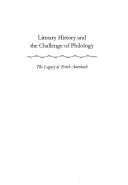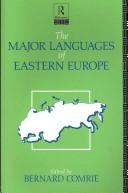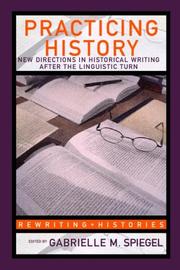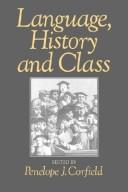Book
ISBN: 1611683920 1299050530 9781611683929 1611683912 9781611683912 9781299050532 1611683904 9781611683905 Year: 2013 Publisher: Waltham, Mass. Brandeis University Press
Abstract | Keywords | Export | Availability | Bookmark
 Loading...
Loading...Choose an application
- Reference Manager
- EndNote
- RefWorks (Direct export to RefWorks)
Language and ideology in the scholarship of the late Middle Ages
Language and languages --- Language and culture. --- Middle Ages. --- Language and history. --- Culture and language --- Culture --- Dark Ages --- History, Medieval --- Medieval history --- Medieval period --- Middle Ages --- World history, Medieval --- World history --- Civilization, Medieval --- Medievalism --- Renaissance --- History and language --- Linguistics and history --- History --- Foreign languages --- Languages --- Anthropology --- Communication --- Ethnology --- Information theory --- Meaning (Psychology) --- Philology --- Linguistics --- Philosophy --- Early works to 1800.

ISBN: 0804725454 Year: 1996 Publisher: Stanford, Calif. Stanford University Press
Abstract | Keywords | Export | Availability | Bookmark
 Loading...
Loading...Choose an application
- Reference Manager
- EndNote
- RefWorks (Direct export to RefWorks)
Literature --- Auerbach, Erich --- 82 --- Language and history --- -Literature and history --- Philology --- History and literature --- History and poetry --- Poetry and history --- History --- Belles-lettres --- Western literature (Western countries) --- World literature --- Authors --- Authorship --- History and language --- Linguistics and history --- Literatuur. Algemene literatuurwetenschap --- History and criticism --- -Theory, etc --- Language and history. --- Literature and history. --- Philology. --- Theory, etc. --- 82 Literatuur. Algemene literatuurwetenschap --- Literature and history --- History and criticism&delete& --- Theory, etc --- Auerbach, Erich, --- Oʼerbakh, Erikh, --- אוארבך, אריך --- אוארבך, אריך, --- 82 Literature in general --- Literature in general --- Literature History and criticism --- Auerbach (erich), 1892-1957 --- Philologie --- Litterature --- Litterature et histoire --- Langage et histoire --- Histoire et critique --- Theorie, etc.

ISBN: 041505771X 9780415057714 9780203216149 9781134932603 9781134932641 9781134932658 9781138429291 Year: 1990 Publisher: London Routledge
Abstract | Keywords | Export | Availability | Bookmark
 Loading...
Loading...Choose an application
- Reference Manager
- EndNote
- RefWorks (Direct export to RefWorks)
Linguistics --- Eastern and Central Europe --- Slavic languages --- Ural-Altaic languages --- Langues slaves --- Langues ouralo-altaïques --- Europe, Eastern --- Europe de l'Est --- Languages --- Langues --- #KVHA:Linguistiek; Oost-Europa --- Language and culture --- Language and history --- Slavic languages. --- Ural-Altaic languages. --- Oeraalse talen. --- Slavische talen. --- Talen. --- Turkse talen. --- Langues ouralo-altaïques --- Scythian languages --- Turanian languages --- Altaic languages --- Samoyedic languages --- Balto-Slavic languages --- Slavonic languages --- Indo-European languages --- History and language --- Linguistics and history --- History --- Culture and language --- Culture --- Languages. --- Europe [Eastern ] --- Language and culture - Europe, Eastern --- Language and history - Europe, Eastern --- Europe, Eastern - Languages

ISBN: 0415341086 0415341078 9780415341080 9780415341073 9780203335697 9781134296798 9781134296835 9781134296842 Year: 2005 Volume: *14 Publisher: New York, N.Y. Routledge
Abstract | Keywords | Export | Availability | Bookmark
 Loading...
Loading...Choose an application
- Reference Manager
- EndNote
- RefWorks (Direct export to RefWorks)
"Gabrielle Spiegel presents an essential new collection of key articles that examine the current status of the debate over the 'linguistic turn', and attempt to rethink the practice of history in light of its implications. These are writings that operate within the framework of the linguistic turn, yet seek to move beyond its initial formulation and reception. The volume offers a synoptic overview of the last twenty-five years of theoretical analysis of historical writing, with a critical examination of the key concepts and positions that have been in debate. This collection delineates the emergence of a new 'practice theory' as a possible paradigm for future historical interpretation concerned with questions of agency, experience and the subject. Articles drawn from a mix of critical thinkers and practicing historians are drawn together along with clear and thorough editorial material. Complex ideas at the forefront of historical practice are revealed and made accessible to students, while for their teachers and other historians this new survey is an indispensable and timely read"--Provided by publisher.
History as a science --- Criticism [Historical ] --- Critique historique --- Geschiedkundige methodologie --- Geschiedschrijving --- Geschiedschrijving--Methodologie --- Historical criticism --- Historical method --- Historical methodology --- Historiografie --- Historiographie --- Historiography --- Historische kritiek --- Historische methode --- Historische methodologie --- History--Criticism --- Kritiek [Historische ] --- Language and history --- Language et histoire --- Methodologie [Historische ] --- Methodology [Historical ] --- Taal en geschiedenis --- Historiography. --- Language and history. --- Writing --- Langage et histoire --- Ecriture --- History. --- Histoire --- 930.2 --- Methoden en technieken van de geschiedwetenschap --- Geschiedenis van opvoeding en onderwijs --- handboeken en inleidingen --- handboeken en inleidingen. --- 930.2 Methoden en technieken van de geschiedwetenschap --- Hieroglyphics --- History and language --- Linguistics and history --- History --- Authorship --- Criticism

ISBN: 0631167331 Year: 1991 Publisher: Oxford Blackwell
Abstract | Keywords | Export | Availability | Bookmark
 Loading...
Loading...Choose an application
- Reference Manager
- EndNote
- RefWorks (Direct export to RefWorks)
Class distinction --- Classes [Social ] --- Classes sociales --- Distinction entre les classes --- Klassen [Sociale ] --- Klassenonderscheid --- Langage -- Aspects sociaux --- Langage -- Sociologie --- Langage et société --- Language and history --- Language and languages -- Social aspects --- Language and languages -- Sociological aspects --- Language and society --- Language et histoire --- Langues -- Aspects sociaux --- Langues -- Sociologie --- Rank --- Social classes --- Sociale klassen --- Society and language --- Sociolinguistics --- Sociolinguistique --- Sociolinguïstiek --- Sociologie des langues --- Sociologie du langage --- Sociology of language --- Société et langage --- Taal en geschiedenis --- Language and languages --- Language and culture --- Linguistics --- Sociology --- Integrational linguistics (Oxford school) --- Classes, Social --- Caste --- Estates (Social orders) --- Social status --- Class consciousness --- Classism --- Social stratification --- History and language --- Linguistics and history --- History --- Social aspects --- Sociological aspects --- Sociolinguistics. --- Social classes. --- Language and history.
Book
ISBN: 3030270378 9783030270377 9783030270360 303027036X Year: 2020 Publisher: Cham Palgrave Macmillan
Abstract | Keywords | Export | Availability | Bookmark
 Loading...
Loading...Choose an application
- Reference Manager
- EndNote
- RefWorks (Direct export to RefWorks)
"In the age of information warfare, Ludendorff’s assertion, ‘The right words, battles won; the wrong words, battle lost’, was never truer. This important collection restores interpreters, translators and language specialists to the heart of the action where, searching for the right words to mediate conflict or manage hostilities, they have long stood but rarely received the recognition they deserve." -- Kevin Foster, Head, School of Languages, Literatures, Cultures and Linguistics, Monash University, Australia. This edited book provides a multi-disciplinary approach to the topics of translation and cross-cultural communication in times of war and conflict. It examines the historical and contemporary experiences of interpreters in war and in war crimes trials, as well as considering policy issues in communication difficulties in war-related contexts. The range of perspectives incorporated in this volume will appeal to scholars, practitioners and policy-makers, particularly in the fields of translating and interpreting, conflict and war studies, and military history. Amanda Laugesen is Director of the Australian National Dictionary Centre at the Australian National University. She is the author of a number of books, including Furphies and Whizz-bangs: Anzac Slang from the Great War (2015) and Taking Books to the World: American Publishers and the Cultural Cold War (2017). Richard Gehrmann is Senior Lecturer in International Studies at the University of Southern Queensland, Australia. He has published on war and society and (with Jessica Gildersleeve) is co-editor of the book Memory and the Wars on Terror: Australian and British Perspectives (2017).
Language and history. --- Sociolinguistics. --- History and language --- Linguistics and history --- History --- Polemology --- Mass communications --- Interpreting --- Translation and interpretation. --- Peace. --- Military history. --- Intercultural communication. --- Political communication. --- Translation. --- Conflict Studies. --- History of Military. --- Intercultural Communication. --- Political Communication. --- Political communication --- Political science --- Cross-cultural communication --- Communication --- Culture --- Cross-cultural orientation --- Cultural competence --- Multilingual communication --- Technical assistance --- Military historiography --- Military history --- Wars --- Historiography --- Naval history --- Coexistence, Peaceful --- Peaceful coexistence --- International relations --- Disarmament --- Peace-building --- Security, International --- Interpretation and translation --- Interpreting and translating --- Language and languages --- Literature --- Translation and interpretation --- Translators --- Anthropological aspects --- Translating
Book
ISBN: 1283277328 9786613277329 0520947592 9780520947597 9780520262041 0520262042 9780520262058 0520262050 Year: 2011 Publisher: Berkeley University of California Press
Abstract | Keywords | Export | Availability | Bookmark
 Loading...
Loading...Choose an application
- Reference Manager
- EndNote
- RefWorks (Direct export to RefWorks)
This book is about history and the practical power of language to reveal historical change. Christopher Ehret offers a methodological guide to applying language evidence in historical studies. He demonstrates how these methods allow us not only to recover the histories of time periods and places poorly served by written documentation, but also to enrich our understanding of well-documented regions and eras. A leading historian as well as historical linguist of Africa, Ehret provides in-depth examples from the language phyla of Africa, arguing that his comprehensive treatment can be applied by linguistically trained historians and historical linguists working with any language and in any area of the world.
Social history. --- Language and history. --- History --- Descriptive sociology --- Social conditions --- Social history --- Sociology --- History and language --- Linguistics and history --- Historiography --- Methodology. --- Africa --- History. --- Histoire sociale. --- Histoire --- Langage et histoire --- Langage et histoire. --- Méthodologie. --- Afrique --- Conditions sociales --- Histoire. --- africa. --- african classical age. --- african history. --- african languages. --- african linguistics. --- easy to read. --- engaging. --- historians. --- historical linguists. --- historical studies. --- historical study. --- historical. --- historiography. --- history of languages. --- history scholars. --- history. --- language and grammar. --- language phyla. --- language. --- linguistic history. --- linguistics. --- nonfiction guide. --- nonfiction. --- oral histories. --- political. --- power of language. --- world history. --- world languages.
Book
ISBN: 6074627746 9786074627749 9786074620818 Year: 2015 Publisher: México, D.F. : El Colegio de México,
Abstract | Keywords | Export | Availability | Bookmark
 Loading...
Loading...Choose an application
- Reference Manager
- EndNote
- RefWorks (Direct export to RefWorks)
Indians of Mexico --- Sociolinguistics --- Anthropological linguistics --- Multilingualism --- Languages in contact --- Language and languages --- Language and culture --- Spanish language --- Areal linguistics --- Castilian language --- Romance languages --- Culture and language --- Culture --- Foreign languages --- Languages --- Anthropology --- Communication --- Ethnology --- Information theory --- Meaning (Psychology) --- Philology --- Linguistics --- Plurilingualism --- Polyglottism --- Anthropo-linguistics --- Ethnolinguistics --- Language and ethnicity --- Linguistic anthropology --- Linguistics and anthropology --- Language and society --- Society and language --- Sociology of language --- Sociology --- Integrational linguistics (Oxford school) --- Languages. --- Study and teaching --- History. --- Social aspects --- Sociological aspects --- Mexico --- Language and history. --- Sociolingüística --- Lenguaje e historia. --- Etnolingüística --- History and language --- Linguistics and history --- History
Book
ISBN: 6074627738 9786074627732 9786074620801 Year: 2015 Publisher: México, D.F. : El Colegio de México,
Abstract | Keywords | Export | Availability | Bookmark
 Loading...
Loading...Choose an application
- Reference Manager
- EndNote
- RefWorks (Direct export to RefWorks)
Indians of Mexico --- Sociolinguistics --- Anthropological linguistics --- Multilingualism --- Languages in contact --- Language and languages --- Language and culture --- Spanish language --- Anthropo-linguistics --- Ethnolinguistics --- Language and ethnicity --- Linguistic anthropology --- Linguistics and anthropology --- Anthropology --- Linguistics --- Castilian language --- Romance languages --- Foreign languages --- Languages --- Communication --- Ethnology --- Information theory --- Meaning (Psychology) --- Philology --- Culture and language --- Culture --- Areal linguistics --- Plurilingualism --- Polyglottism --- Language and society --- Society and language --- Sociology of language --- Sociology --- Integrational linguistics (Oxford school) --- Languages. --- Study and teaching --- History. --- Social aspects --- Sociological aspects --- Mexico --- Language and history. --- Sociolingüística --- Lenguaje e historia. --- Etnolingüística --- History and language --- Linguistics and history --- History
Multi
ISBN: 9780748635986 074863598X 9780748635993 0748635998 128274965X 9781282749658 9780748671472 0748671471 9786612749650 6612749652 Year: 2010 Publisher: Edinburgh Edinburgh University Press
Abstract | Keywords | Export | Availability | Bookmark
 Loading...
Loading...Choose an application
- Reference Manager
- EndNote
- RefWorks (Direct export to RefWorks)
This book explores the dynamics of language and social change in central Europe in the context of the end of the Cold War and eastern expansion of the European Union. One outcome of the profound social transformations in central Europe since the Second World War has been the reshaping of the relationship between particular languages and linguistic varieties, especially between 'national' languages and regional or ethnic minority languages. Previous studies have investigated these transformed relationships from the macro perspective of language policies, while others have taken more fine-grained approaches to individual experiences with language. Combining these two perspectives for the first time--and focusing on the German language, which has a uniquely complex and problematic history in the region--the authors offer an understanding of the complex constellation of language politics in central Europe. Stevenson and Carl's analysis draws on a range of theoretical, conceptual and analytical approaches - language ideologies, language policy, positioning theory, discourse analysis, narrative analysis and life histories - and a wide range of data sources, from European and national language policies to individual language biographies. The authors demonstrate how the relationship between German and other languages has played a crucial role in the politics of language and processes of identity formation in the recent history of central Europe.
Social change --- Sociolinguistics --- Language and languages --- Language policy --- German language --- Political aspects. --- Political aspects --- History. --- Eastern and Central Europe --- Language and history --- History and language --- Linguistics and history --- History --- Ashkenazic German language --- Hochdeutsch --- Judaeo-German language (German) --- Judendeutsch language --- Judeo-German language (German) --- Jüdisch-Deutsch language --- Jüdischdeutsch language --- Germanic languages --- Glottopolitics --- Institutional linguistics --- Language and state --- Languages, National --- Languages, Official --- National languages --- Official languages --- State and language --- Communication policy --- Language planning --- Change, Social --- Cultural change --- Cultural transformation --- Societal change --- Socio-cultural change --- Social history --- Social evolution --- Language and society --- Society and language --- Sociology of language --- Language and culture --- Linguistics --- Sociology --- Integrational linguistics (Oxford school) --- Government policy --- Social aspects --- Sociological aspects --- Language and languages Political aspects

 Search
Search Feedback
Feedback About UniCat
About UniCat  Help
Help News
News